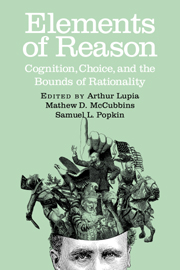Book contents
- Frontmatter
- Contents
- List of Tables and Figures
- Acknowledgments
- List of Contributors
- Beyond Rationality: Reason and the Study of Politics
- PART I EXTERNAL ELEMENTS OF REASON
- PART II INTERNAL ELEMENTS OF REASON
- 8 Reconsidering the Rational Public: Cognition, Heuristics, and Mass Opinion
- 9 Three Steps toward a Theory of Motivated Political Reasoning
- 10 Knowledge, Trust, and International Reasoning
- 11 Coping with Trade-Offs: Psychological Constraints and Political Implications
- 12 Backstage Cognition in Reason and Choice
- 13 Constructing a Theory of Reasoning: Choice, Constraints, and Context
- References
- Author Index
- Subject Index
8 - Reconsidering the Rational Public: Cognition, Heuristics, and Mass Opinion
Published online by Cambridge University Press: 05 June 2012
- Frontmatter
- Contents
- List of Tables and Figures
- Acknowledgments
- List of Contributors
- Beyond Rationality: Reason and the Study of Politics
- PART I EXTERNAL ELEMENTS OF REASON
- PART II INTERNAL ELEMENTS OF REASON
- 8 Reconsidering the Rational Public: Cognition, Heuristics, and Mass Opinion
- 9 Three Steps toward a Theory of Motivated Political Reasoning
- 10 Knowledge, Trust, and International Reasoning
- 11 Coping with Trade-Offs: Psychological Constraints and Political Implications
- 12 Backstage Cognition in Reason and Choice
- 13 Constructing a Theory of Reasoning: Choice, Constraints, and Context
- References
- Author Index
- Subject Index
Summary
There has been a marked change in the way political scientists think about the American citizenry. Beginning with the advent of survey research in the 1940s, students of public opinion took a dim view of citizens' political capabilities. Consistently finding a public profoundly lacking in political knowledge and sophistication, they became skeptical of the individual citizen's ability to make intelligent political decisions or to participate effectively in the political process (see Kinder 1983 and Sniderman 1993 for comprehensive reviews).
Over the past decade, leading scholars have offered grounds for a much more positive view of citizen competence. They do not dispute the finding of widespread political ignorance or claim that the citizen's command of politics has recently improved. Rather, they offer two arguments to suggest that even an uninformed citizenry can participate in politics competently. One is that individuals use heuristics – mental shortcuts that require hardly any information – to make fairly reliable political judgments. By this means, Sniderman, Brody, and Tetlock (1991: 19) write, “people can be knowledgeable in their reasoning about political choices without necessarily possessing a large body of knowledge about politics.” The other argument is that public opinion is rational in the aggregate, even if individual opinion is prone to error (Page and Shapiro 1992; see also Converse 1990). Individual errors cancel out in the process of aggregation, and thus collective opinion conveys real and true information about the citizenry's preferences.
The two proposals struck a chord among political scientists. Sniderman, Brody, and Tetlock's Reasoning and Choice (1991) and Popkin's The Reasoning Voter (1991) stimulated widespread attention to political heuristics.
- Type
- Chapter
- Information
- Elements of ReasonCognition, Choice, and the Bounds of Rationality, pp. 153 - 182Publisher: Cambridge University PressPrint publication year: 2000
- 178
- Cited by



